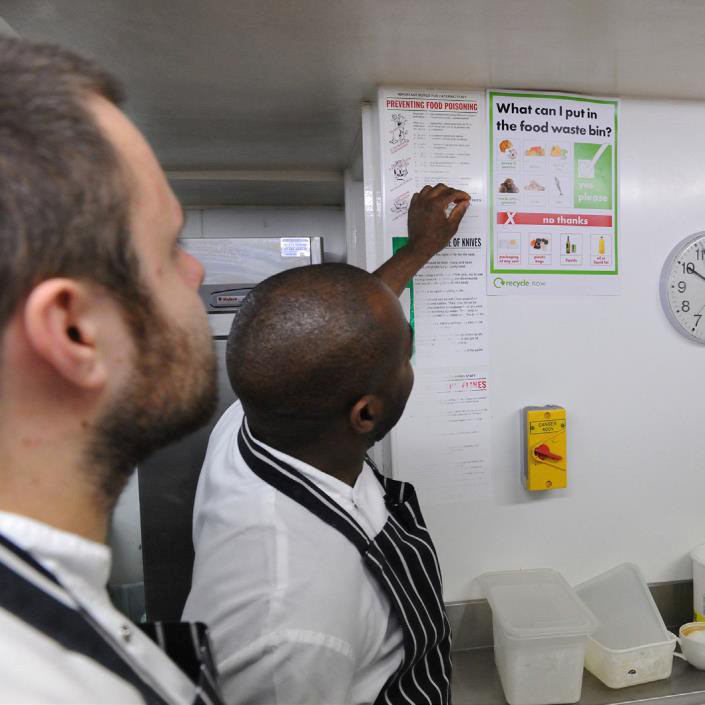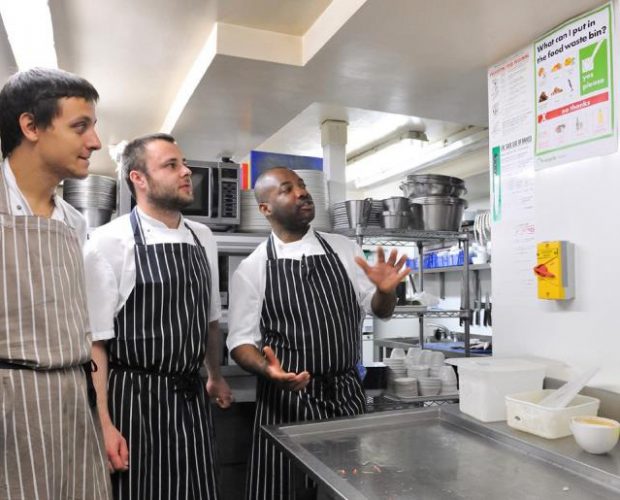Elior
Elior is a leading provider of food services. Recognising the impact of food services on society, it has made sustainable development an integral part of its business strategy.
TRACKING AND SAVING
A review at a single Elior site suggested a range of initiatives that offered possible annual cost savings of £2,441 and diversion of 1.6 tonnes of waste from landfill.
By implementing a tracking system the company realised that it was throwing away greater levels of food than imagined.
“Recording our wastage by weight has helped us enormously.“
“In the first week, the chef manager phoned me to say he couldn’t believe that they had filled a whole bag of food waste. Previously, we had no indication on the volume being wasted. If anything, just holding on to the waste before disposal allows you a clear view of the quantities.”
TIP
Get your kitchen crew involved in making savings. The “Guardians of Grub” poster will be a great addition to your staff noticeboard.

“Our teams have embraced our culture of sustainability. At one site, we use the remaining peel from a machine that squeezes fresh oranges, to make marmalade, which is sold on site to raise money for charity”
Mark Hall
Regional Director for the South, Elior
GETTING THE WHOLE TEAM INVOLVED
An initial review showed that food preparation techniques could be tweaked to make savings. The chef manager organised a training session to demonstrate the correct way to prepare fruit and vegetables and make the most of ingredients.
Staff have been keen to participate, suggesting menu ideas that make use of items that were previously under-used, such as the cooking of parsnip peelings to make soup. This technique acts as an extension of the company’s already rigorous menu planning system. The system ensures that only 1.6 per cent of the annual food budget goes unsold.
“For our Kitchen Planner we look at what’s in season, and also receive a market report from head office which tells us which items are likely to be difficult to source or expensive. For example, a drought in the South East could mean low yields of cauliflower, so we would remove them from our menus and replace them with broccoli. We also check information such as the number of people likely to be on site and consuming food, and we base our ordering on these figures.”
SEEING IS BELIEVING
The use of clear bags when separating food waste has been crucial to success.
“When you can actually see the mass, it makes an enormous difference. We learnt quicklythat some of the things going in the bins during production such as the tops from peppers, for example –could be made use of. The main point for us was that staff were completely unaware of the physical quantities being thrown away. We were always under the belief that we didn’t have a large volume of food waste, because it was being recorded in financial terms rather than weight.”
The system has been straightforward to implement, with staff putting waste into bags as they prepare food throughout the day. Elior has also posted signs in the canteen to raise awareness around uneaten food. Using clear bags for food thrown away has helped to emphasise the quantities involved.

The review has helped Elior to highlight areas for improvement, cut costs, and demonstrate its commitment to the environment. The company is exploring the potential for a separate food waste collection for disposal to anaerobic digestion (AD). It also aims to apply the monitoring systems to other sites around the UK.
“This has been really simple, with easy results, and the site staff have been able to see that it’s had a really significant impact.”
Mark Hall
